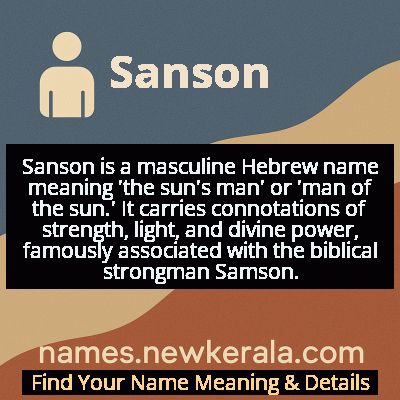Sanson Name Meaning & Details
Origin, Popularity, Numerology Analysis & Name Meaning of Sanson
Discover the origin, meaning, and cultural significance of the name SANSON. Delve into its historical roots and explore the lasting impact it has had on communities and traditions.
Name
Sanson
Gender
Male
Origin
Hebrew
Lucky Number
1
Meaning of the Name - Sanson
Sanson is a masculine Hebrew name meaning 'the sun's man' or 'man of the sun.' It carries connotations of strength, light, and divine power, famously associated with the biblical strongman Samson.
Sanson - Complete Numerology Analysis
Your Numerology Number
Based on Pythagorean Numerology System
Ruling Planet
Sun
Positive Nature
Leaders, ambitious, highly driven, self-reliant, innovative.
Negative Traits
Overly aggressive, domineering, impatient, selfish.
Lucky Colours
Red, orange, gold.
Lucky Days
Sunday.
Lucky Stones
Ruby, garnet.
Harmony Numbers
2, 3, 9.
Best Suited Professions
Entrepreneurs, managers, engineers.
What People Like About You
Courage, determination, leadership.
Famous People Named Sanson
Sanson of Persia
Royal Executioner
Served as the official executioner for French kings Louis XIV and Louis XV
Sanson family
Executioners
French dynasty of executioners who served for six generations from 1688 to 1847
Sanson Carrasco
Literary Character
Character in Miguel de Cervantes' 'Don Quixote'
Sanson (biblical)
Biblical Judge
Alternative spelling of Samson, known for his supernatural strength
Name Variations & International Equivalents
Click on blue names to explore their detailed meanings. Gray names with will be available soon.
Cultural & Historical Significance
Beyond its biblical roots, Sanson gained prominence in European history through the famous French executioner dynasty that served from the 17th to 19th centuries. This association created a dual cultural identity for the name - simultaneously representing divine strength from its Hebrew origins and the grim reality of justice and mortality through its French historical context. The name appears in various literary works, most notably in Cervantes' Don Quixote as Sanson Carrasco, further embedding it in Western cultural consciousness.
The name's journey through different cultures demonstrates how names can accumulate multiple layers of meaning, from its original Hebrew solar symbolism to French historical associations and literary appearances. This rich tapestry of meanings makes Sanson a name that carries centuries of cultural history and symbolic weight.
Extended Personality Analysis
Individuals named Sanson are often perceived as possessing great inner strength and determination, reflecting the name's association with the biblical strongman. They tend to be natural leaders with a strong sense of justice and moral conviction, though they may sometimes struggle with trusting others too readily. Their strength often comes with a corresponding vulnerability in personal relationships, creating a complex personality that balances power with emotional depth.
Sansons typically exhibit loyalty and dedication to their causes, often taking on protective roles within their families and communities. They may possess a charismatic presence that draws others to them, but they can also be stubborn when their principles are challenged. The historical weight of the name often inspires those who bear it to live up to its legacy of strength and resilience, while also learning from the cautionary aspects of the biblical narrative about the importance of wisdom and discretion.
These individuals often display a combination of physical vitality and intellectual curiosity, with many excelling in fields that require both strength of character and mental acuity. They tend to be passionate in their pursuits and relationships, sometimes to the point of intensity that can be both inspiring and overwhelming to others. The name's solar symbolism often manifests in a warm, radiant personality that can light up rooms and inspire those around them.
Modern Usage & Popularity
In contemporary times, Sanson remains a relatively uncommon but culturally resonant name, particularly in communities with Hebrew or French heritage. While not ranking among popular baby names in most English-speaking countries, it maintains steady usage among families seeking names with strong biblical or historical significance. The name has seen occasional revivals when biblical names experience popularity cycles, and it continues to be used in French-speaking regions and among Jewish communities worldwide. Modern usage often emphasizes the name's connection to strength and resilience rather than its executioner associations, with parents choosing it for its powerful biblical roots and distinctive sound that stands out without being overly unusual.
Symbolic & Spiritual Meanings
Symbolically, Sanson represents strength, sacrifice, and the duality of human nature. The name carries solar symbolism from its Hebrew roots, representing light, power, and divine favor. It also embodies the concept of strength tempered by vulnerability, as demonstrated in the biblical narrative where physical power is compromised by emotional weakness. The name symbolizes the idea that true strength involves not just physical might but also moral courage and the wisdom to use power responsibly. Additionally, it represents redemption through sacrifice and the transformative power of overcoming personal limitations, serving as a reminder that even the strongest individuals have vulnerabilities that can become sources of both downfall and ultimate triumph.

